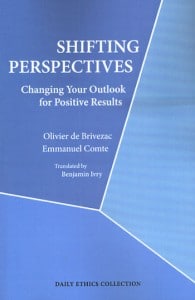We will be publishing a series of articles on the book „Shifting Perspectives“ by Olivier de Brivezac and Emmanuel Comte. It is available in English and French (ISBN-10: 0976498650 and ISBN-10: 2747557588).
The book offers a series of vivid and easy-to-understand examples that help us to better understand our perception of difficult situations in life and the resulting effects on our psychological balance. We all have to cope with strokes of fate, illnesses, losses, difficult interpersonal relationships or other hardships. What then distinguishes people who apparently cope well with such difficulties from those who suffer greatly or even fall into despair from the conditions of their lives?
Here is a short excerpt from an earlier review of the book in German:
Most of us have probably had the experience of seeing only the negative side of things: complaining, blaming others for one’s misfortune, not being satisfied with anything. If this state increases, every occurrence confirms the ill intention of others, every experience is an injustice. Sometimes we even go so far as to assume „that fate has conspired against us.“ This way of viewing life makes us pessimistic, demotivated, frustrated – it leads us to believe we are being treated unfairly or stirs up envy in us of all those „who are doing better off.“
It is easy to understand that this way of seeing things can lead to a lot of suffering. In their perception, the affected person lives on the dark side of life and feels persecuted by ill-intentioned contemporaries.
This is exactly where the book comes in. A person does not feel well, he suffers. Where does this suffering come from? On the other hand we often see people with difficult fates and who nevertheless go through life cheerfully and lightheartedly and even have the strength to cheer up others? Where is the difference? The authors see the answer in our thinking, in our way of perceiving things. Above all, our expectations, towards life or towards others, as well as the intentions we assume behind the actions of others, strongly contribute to our subjective perception.
This book attempts to provide us with means by which we can learn to diagnose „misconceptions“ of our perceptions. On the basis of easily comprehensible testimonies of affected persons, the authors show how we can detect, recognize and define such thought structures in ourselves. Subsequently, the approach of „agathism“ is presented and deepened. According to the authors, two aspects make up agathism: on the one hand, seeing things as they really are (realism), and on the other hand, seeing things from a positive perspective (optimism).
As a general rule, we can neither change external circumstances, nor the others. Therefore, it makes more sense to focus on the things that we can actually change. Among these changeable things is our own view/perspective on a difficult situation.
The challenge here is to take the „right“ perspective. But what is the right perspective on a difficult situation we are currently in? This is exactly what we want to discuss in more detail in this series of articles. We will not only deal with the recognition of our distorted perceptions of a situation, but above all with the concept of agathism.
But is it enough to force ourselves to want to „see everything through rose-colored glasses“ and to block out all bad experiences? We can certainly all give ourselves the answer …
We will select individual topics and practical examples from the book and present them. The hope is provide help to cope better with the many challenges of life. To help better deal with stress, anxiety and other psychological problems that hinder our personal development.
Acknowledgements to the Fondation Ostad Elahi:
In this first article on the „Shifting Perspective“ series, we would like to express our gratitude to the Fondation Ostad Elahi – Éthique et Solidarité Humaine [1], which granted us permission to present the content of the book in excerpts. However, all subsequent articles dealing with the content will not only be a repetition of the content, but we will always illuminate the content from the Ethica Rationalis point of view, i.e. we will focus especially on the practical application of the presented thoughts.
_______
[1] Ostad Elahi, philosopher and musician, held a high judicial office, and his ethical reflections went far beyond his professional duties. Thus he became a sage of the 20th century. His philosophy of perfection, committed to both tradition and modernity, is to be understood as a response to the great questions that accompany man from the beginning and that are related to his identity and his raison d’être.




